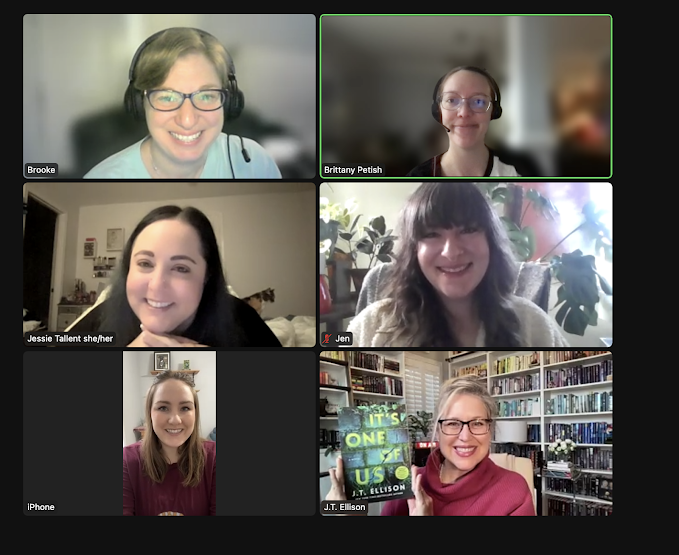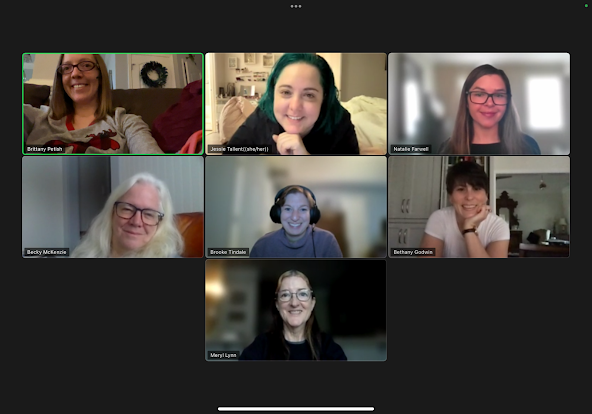Q&A with Joshilyn Jackson of Mother May I
I was fortunate enough to work with the publishers and to get the book club kit for Mother May I with Joshilyn Jackson. I'm going to leave you today with our Q&A for the book.
Q: Mother May I is your tenth novel! Congrats! Can you tell us in your own words a little bit about this book?
JJ: It’s the story of a young mother, Bree Cabbat, who briefly looks away from her youngest child—and he’s gone. It’s every parent’s worst nightmare. We’ve all had that moment. For ninety-nine-point-near-infinity percent of us, our kid saw a bird and squirted off sideways, and that dizzying, stomach-drop horror is resolved to the good in three seconds.
Bree is not so lucky. Her son has been taken. Because this is a Joshilyn Jackson novel, I think you’ve already guessed that this is not about anything as simple as money. In this book, the past has a pulse, and teeth, and it has caught up to Bree Cabbat.
The woman who took the baby is a mother herself, and while what she asks from Bree seems like a small, simple (if highly illegal) task, the consequences will send Bree on a dangerous journey that will change the way she understands the world and could cost her and her family everything. Both of these women will stop at absolutely nothing when their children’s lives are at stake, and yet there is no world in which they can both get what they want.
Q: What was your inspiration for Mother May I?
JJ: I serve on the board and (when we are not in the middle of a pandemic) as a volunteer teacher with a nonprofit called Reforming Arts. Our mission is to offer college-level coursework and degrees to incarcerated people in Georgia’s women’s prisons. We work in partnership with many other institutions and groups, including Georgia State University. We also have a program that assists re-entering citizens as they leave prison and try to create connected, sustainable, livable lives in a system that is stacked against their success.
My students have been eclectic in terms of age, race, and orientation, but they have one thing almost universally common: they grew up in poverty. Many have lived their whole lives in extreme, unimaginable poverty: food insecure, lodging insecure, homeless, in foster care. And a great many of them are now mothers themselves.
My paternal grandparents were working class, my maternal grandparents were poor. I saw my parents work their way into the middle class as I grew up. They sent me to college and helped my husband and me buy our first home—a tiny two-bedroom condo that cost five figures. We are now firmly middle class, and my children have a lovely range of opportunities. The children of my students get one or two chances as they come up, and that is if they are very lucky and have people actively working to help them find support and resources. They are much more likely to end up in prison than my children.
I wanted to explore that disparity, that desperation. Desperation drives people into awful, awful acts. Mother May I began with the idea of two women who both grew up working class and rural, right on the knife-edge of poverty. One lost her husband, and she and her daughter slid into poverty. One, via scholarships and then an advantageous marriage, is now quite wealthy. And yet both these women love their children with the same fierce devotion. Both of these women would do anything to help them—and this is the hinge that puts them in direct opposition.
Q: Mother May I deals with complicated, contemporary issues like privilege, opportunity, complicity, trauma, and justice. Why do you think it’s important to explore such nuanced themes in fiction?
JJ: Story is how I explain the world to myself. It’s how I process my own thoughts and beliefs. Story is how I navigate the questions that are too large to have a simple answer. Writing and reading are how I expand my empathy and my worldview.
That said, it’s not my job as a novelist—or a reader, or a human!—to resolve the world’s troubles. It’s my job to explore them, not to preach.
I write the exact kinds of books I like as a reader: page-turners, with characters I really care about, that both entertain and invite thought and discourse.
Q: Mother May I plays with traditional suspense arcs of “dark secrets” and of a “cat-and-mouse” chase by twisting and subverting readers’ expectations. Why was this important for Mother May I as a story?
JJ: The simple answer is—it’s fun! I love a good twist as much as any reader, and they are also quite thrilling to craft. For me, plot comes last. I know the characters very well, and I know the inciting incident, and I have an end I am walking toward (although I am usually wrong, and the end changes as I write). So when I write a twist or a reversal, it often surprises me.
Character and theme are the craft, the work. Plot is the cookie that makes me excited to do that work. If the twists do not surprise me, how can I expect them to surprise you?
That said, once I discover one, I have to go back and set up for it with foreshadowing and such, because I hate a cheap twist that does not emerge from character and theme. I want the reversals and twists to matter on more than one level.
Q: Many aspects and experiences of motherhood play out through the novel. Without giving anything away, can you talk a bit about how this drives the story?
JJ: The main character is a mother whose child has been taken by a woman who is also a mother. Both of them love their children enough to kill or die for them, and they truly understand this.
I have a protagonist and an antagonist who see each other very clearly, and who also respect each other. But they are on a deadly collision course, and they understand this, too. They cannot both get what they want, and yet they can’t help but feel a weird, connected empathy, even as they work to utterly undo each other. I have a lot of empathy for my antagonist—even though she gives me nightmares. It’s my favorite complication in the book.
Q: What do you most hope readers take away from Mother May I?
JJ: A desire to read more of my books!
I always have the same answer to this question, because I have no agenda in terms of takeaways as a novelist. I hope book clubs will talk about the themes and readers will think about the story and the choices the characters made, but I don’t ever want to read about, much less write, a small, flat world with simple, fictional solutions to complex, actual problems. I write about people who are very real to me, navigating the moral gray areas as best they can. I try my best to do it in a fun, exciting, gripping way that will also provide an escape—that’s my real agenda.
JOSHILYN JACKSON is the New York Times and USA Today bestselling author of nine other novels, including gods in Alabama and Never Have I Ever. Her books have been translated into more than a dozen languages. A former actor, Jackson is also an award-winning audiobook narrator. She lives in Decatur, Georgia, with her husband and their two children.



Comments
Post a Comment
Drop us a line and let us know what you thought about the book...